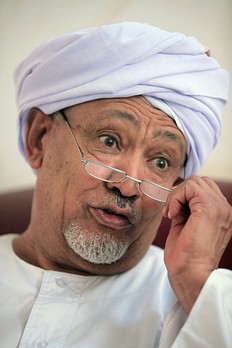Islamists counter “New Dawn” charter with “Islamic Dawn”
February 23, 2013 (KHARTOUM) – A number of Islamic oriented bodies signed the blueprint for the “Islamic Dawn” charter which calls for establishing Sharia’a law in Sudan and banning any parties which oppose that.

“The Islamic opposition will be the alternative to secular opposition,” Mustafa said adding that “if the regime is overthrown the alternative will be an Islamic [government]”.
Mustafa, who is the uncle of president Omer Hassan al-Bashir, lambasted the New Dawn charter signed by opposition forces and rebel groups in Uganda last month calling it a deal to overthrow Islam and not the government.
The Sudanese government and ruling National Congress Party (NCP) launched a fierce campaign against the New Dawn charter saying it aims at changing Sudan’s Arab-Islamic identity and threatened to prosecute and ban its signatories.
“Islamic Dawn” charter calls for drafting an Islamic constitution based on the Quran and Sunna stressing that this should not be subject to any kind of referendum.
Any laws or codes that contradicts Sharia’a law should be abrogated, the charter says. Furthermore, parties or institutions that are based on opposing these principles shall be prohibited.
The charter which consists of 263 articles also calls for spreading a culture of tolerance and forgiveness while strengthening the role of preachers in resolving tribal disputes.
The government must launch war on corruption and act swiftly against those implicated in public and fair trials, the charter says.
It also calls for comprehensive economic reforms based on Sharia’a law and not limit Islamic economy to banking and insurance.
Sudanese officials including president Bashir made it clear that the upcoming constitution will be “100% Islamic” but opposition parties say that this is a cover for oppressive laws.
Some critics assert that the separation of Sudan into north and south in July 2011 was in part a result of Khartoum’s insistence on Islamic law.
The parties which signed the “New Dawn” charter in Kampala agreed on the need to prevent exploitation of religion in politics.
(ST)
